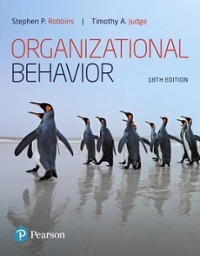Weve all been therewhether your job itself is unfulfilling or if its a particularly slow day at
Question:
We’ve all been there—whether your job itself is unfulfilling or if it’s a particularly slow day at work, boredom strikes the best of us in the workplace. It is not a pleasant feeling. As Andreas Elpidorou, a researcher at the University of Louisville notes, “Boredom is an aversive state characterized by dissatisfaction, restlessness, and weariness. . . . Being in a state of boredom feels like being emotionally trapped.” Boredom can hit organizations hard. A study by Udemy, an online teaching and learning organization, found that employees who are bored tend to be twice as likely to leave their organizations within the next three to six months. Young millennial employees were especially prone to becoming bored at work and were twice as likely to become bored than their baby boomer counterparts. In another study by the Intelligence Group, 64 percent of millennials would prefer to forego a $100,000 salaried position that they think is boring for a $40,000 position that they love.
Being bored at work can have unacceptable consequences that can cause you a lot of trouble if you are not careful. For one, you can let your coworkers down when you’re unresponsive and they need you, especially when they can’t move forward without you. Second, boredom can at times lead to complaining—although this may seem common in organizations (due to media portrayals on TV and movies of complaining employees), it can be irritating to many employees, especially those who are happy with their work. Third, research shows that boredom can lead to the commission of CWBs, especially psychologically withdrawing from the job, sabotaging work equipment, and abusing other coworkers. Fourth, if work is central to an employee’s life and if employees are not getting their needs met in their personal and work lives, boredom can lead to depression. Finally, some people just tend to be more bored than others—the boredom-prone experience a variety of undesirable outcomes, such as receiving less support from their organizations, underemployment, and lower performance ratings.
So how can you get on track if you’re bored in the workplace? One of the keys to tackling boredom is to take control and be proactive. Research on over 1,500 employees in Finland (tracked over three years) suggests that taking control of your job and setting challenges for yourself, along with acquiring the resources you need to do the job well, reduce boredom gradually over time. Part of this involves forcing yourself to be more curious and looking outside your own responsibilities. When we become overwhelmed by the monotony of familiar work, it is time to find new insights, perspectives, and ways of approaching our tasks. Others suggest that offering learning opportunities and reducing consistent hours worked, especially for millennials, may be effective in reducing boredom at work. Notably, the Udemy survey found that 80 percent of employees would become more interested in their tasks if they were given the opportunity to learn more skills.
Questions
1. Who is responsible for reducing boredom in the workplace and why? Is it the employer? The one who is bored?
2. Do you think certain tasks are inherently boring and thus cannot be changed? If yes, what are they? If there are tasks that cannot be made more interesting, how can the negative effects of boredom be mitigated for the employees who must perform those tasks?
3. Which emotion regulation technique do you think would be the most successful in mitigating boredom and why?
Step by Step Answer:

Organizational Behavior
ISBN: 9780134729329
18th Edition
Authors: Stephen RobbinsTimothy JudgeTimothy Judge, Timothy Judge





